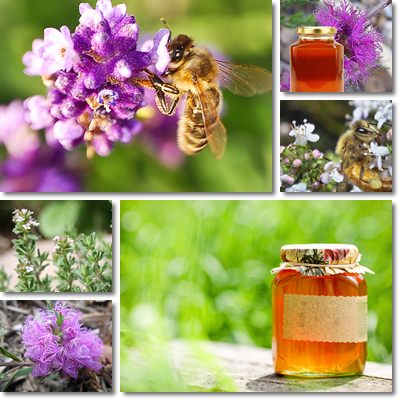Thyme honey is a variety of monofloral honey made from the nectar and pollen of thyme flowers, particularly the common thyme species (Thymus vulgaris). Just like the plant of origin, the honey too is aromatic, with a unique flavor profile and an intense taste. As for its medicinal properties, thyme honey boasts strong antioxidant, antibacterial, cough-relieving and expectorant, energizing and immunomodulating health effects. The raw, unprocessed, unfiltered honey is the healthiest because it preserves all its beneficial compounds unaltered.
Thyme honey is produced from the flower nectar and pollen of several species of thyme, notably Thymus vulgaris (common thyme), Thymus serpyllum (wild thyme) and Thymus herba-barona (caraway thyme). For example, thyme honey from Greece is primarily made from wild thyme growing freely in the Greek highlands and appreciated to be a clean, natural honey. The popular thyme honey originating in New Zealand is produced from the common thyme species and hold excellent antimicrobial properties. The same honey produced in Italy is made mostly from wild thyme and caraway thyme and may take on a more floral flavor. Other countries such as Turkey or Spain produce the variety as well.

Thyme honey is a monofloral or unifloral variety, but it does not mean it is made from a single flower source. Actually, all monofloral honey varieties are made from the nectar and pollen of multiple flowering plant species, with one species being predominant. The general consensus is that about 45% of the pollen content of a honey has to be from a single plant source to be considered monofloral. However, some honeys are labelled as unifloral with as little as 15% pollen from a single source, while others may have as much as 80% pollen from a single species. Similarly, thyme honey is produced from one main thyme species, but may contain pollen and nectar from other thyme species or flowering plants.
What does thyme honey look like? Generally, the variety has a lighter amber color, but depending on the species of thyme predominant it may be darker-colored as well, for example, amber with slight orange reflexes or dark amber (brownish-red). Greek thyme honey, made predominantly from wild thyme, is a darker amber.
How fast does thyme honey crystallize?. Thyme honey has a medium crystallization time, after a few months following harvest, and forms fine to medium crystals. Its color also changes and becomes paler, a light amber with yellow undertones for the lighter varieties or a darker yellow with brownish undertones for the darker varieties.
What does thyme honey taste and smell like? Thyme honey is highly aromatic, with a medium sweetness and a strong, lasting taste and smell. It has a rich flavor profile which includes spicy-pungent, resinous, herbal notes. Other aromas identified in the honey include floral, especially in the Italian varieties, but also a clove, peppery or even wine aftertaste. Overall, the flavor profile is complex, rich, aromatic, herbal and strong.

What are the health benefits of thyme honey? The properties of this particular type of honey make it good for a variety of health issues such as fatigue, acne or gastritis, but the honey focuses primarily on improving the health of the digestive and respiratory systems. Here are 8 reasons why thyme honey is good for you:
1) Strong antibacterial action. The thyme plant is an aromatic herb because it is rich in essential oils. These essential oils are not only flavor-giving compounds, but also boast impressive antimicrobial and antifungal effects. The strong aroma of the honey is also indicative of the presence of such antimicrobial compounds which account for its antibacterial action. In addition to this, thyme, like most honeys, contains an important natural antibacterial called hydrogen peroxide, which is largely responsible for reducing bacteria numbers and preventing bacteria spread.
Other elements that account for the antibacterial action of the honey are its acidic pH and low moisture content, both of which work towards reducing bacterial load and containing infection. Thyme and other honeys are a great help in the treatment of respiratory infections such as colds, flue, rhino-sinusitis, bronchitis etc. and their symptoms, whether it’s a sore throat, a relentless cough or lack of appetite, improving wound healing time and even reducing acne breakouts because of their strong antibacterial action.
2) Helps relieve cough. The honey has a thick consistency and is soothing, which helps calm the cough reflex, aiding in relieving cough. Moreover, it can help get rid of phlegm when added to warm tea, a combination which gives it mild expectorant properties. Adding lemon juice or choosing a more astringent tea can help increase the expectorant effect (thyme honey and lemon tea, for example).
3) Soothes sore throat naturally. The honey’s viscous, sugary-sticky consistency allows it to adhere to the throat lining, forming a protective layer that allows the irritated mucosa to heal. Moreover, its antibacterial action contributes to reducing bacterial load if the infection is located in the throat. But for the honey to be efficient, it has to be raw and unheated and you have to avoid eating or drinking for at least an hour afterwards and repeat the remedy several times a day.
4) Good for gastritis. Thyme honey may help with gastritis by exerting a soothing action on the irritated stomach lining, encouraging it to heal. This effect is believed to be a result of the honey’s antibacterial action and naturally thick consistency which may exert a soothing, anti-inflammatory action on the stomach lining. It is recommended to take one tablespoon of raw, unheated honey on an empty stomach in the morning and postpone eating or drinking anything for at least an hour afterwards.
However, gastritis is a serious medical issue and eating honey is but a an alternative, complementary treatment approach. While efficient in its own way, it does not replace a strict eating regimen (read more about what foods to eat and to avoid for gastritis) and other medical recommendations, so make sure you see a doctor.
5) Source of vitamins and other nutrients. With a generous content of natural sugars and small amounts of vitamins, minerals, amino acids and other elements with nutritional value such as pollen or beeswax, thyme honey is nutritious and can be considered a healthy addition to one’s diet. Some of the nutrients found in the honey are vitamin C, potassium, calcium, sodium and very little magnesium, copper, iron and zinc.
6) Energizing effect. Thyme honey is a natural tonic which restores good energy levels, fights fatigue, helps restore appetite and prevents hypoglycemia. A single tablespoon can give one energy for 15 minutes or more.
7) Immunomodulating properties. Like all other honey varieties, thyme too contains pollen, sometimes in very high amounts (up to 90%). Research has revealed pollen has immunomodulating properties, improving the immune system response, for example, by increasing the number of white blood cells. In other words, eating honey has positive implications for our immune system response, provided, of course, we are not allergic.
Allergic reactions. The pollen in thyme honey is both good and bad. It’s good because it stimulates the immune system to respond better to bacteria and other pathogens. At the same time, it’s bad because people with an overactive immune system might be allergic to this particular type of pollen and risk having a potentially life-threatening allergic reaction if they eat the honey. Another possibility is being allergic to other elements in the honey, not pollen, but enzymes secreted by honey bees to make the honey. In this case, an allergic person should avoid all honey varieties and other bee products (royal jelly, bee bread and so on).
8) Source of potent antioxidants. The darker the honey, the greater its antioxidant content. Thyme honey contains good amounts of antioxidant polyphenols, particularly flavonoids, but also carotenoids, all of which protect cells against oxidative damage and contribute to preventing more serious diseases caused by oxidative stress such as cancer, diabetes, cardiovascular disease and inflammatory diseases in general.
Conclusion
Thyme honey is a strong-flavored, floral-herbal scented honey with several impressive health benefits. It helps with wound healing, relieves cough, reduces sore throat discomfort, is energizing and antioxidant. It can be used as food or topically on the skin for blemishes, redness or acne. For best results, the honey has to be raw, unheated and unfiltered. Processing the honey with heat to make it liquid, filtering out all of its nutritious elements or subjecting it to improper storage conditions can greatly affect its beneficial properties.
